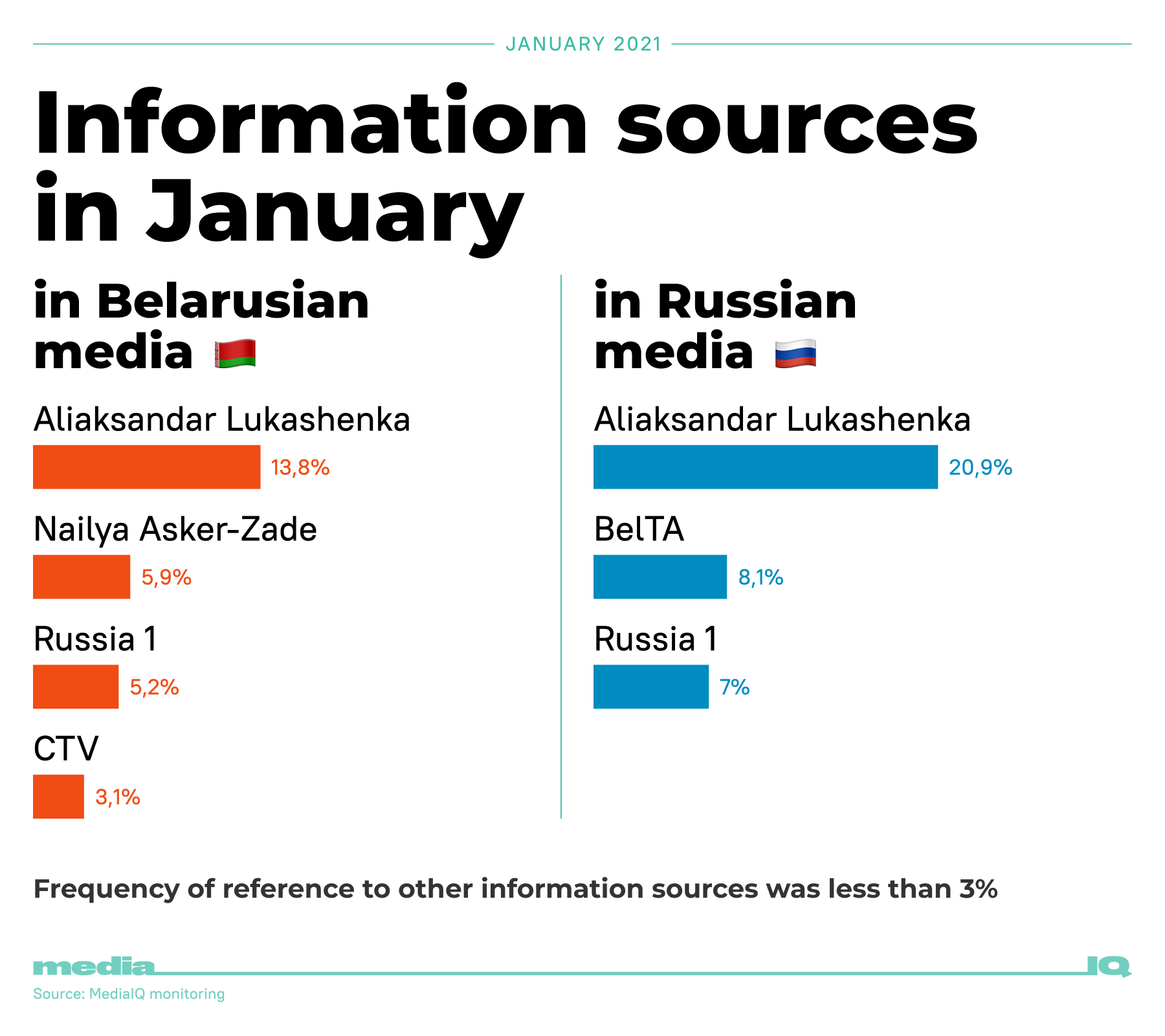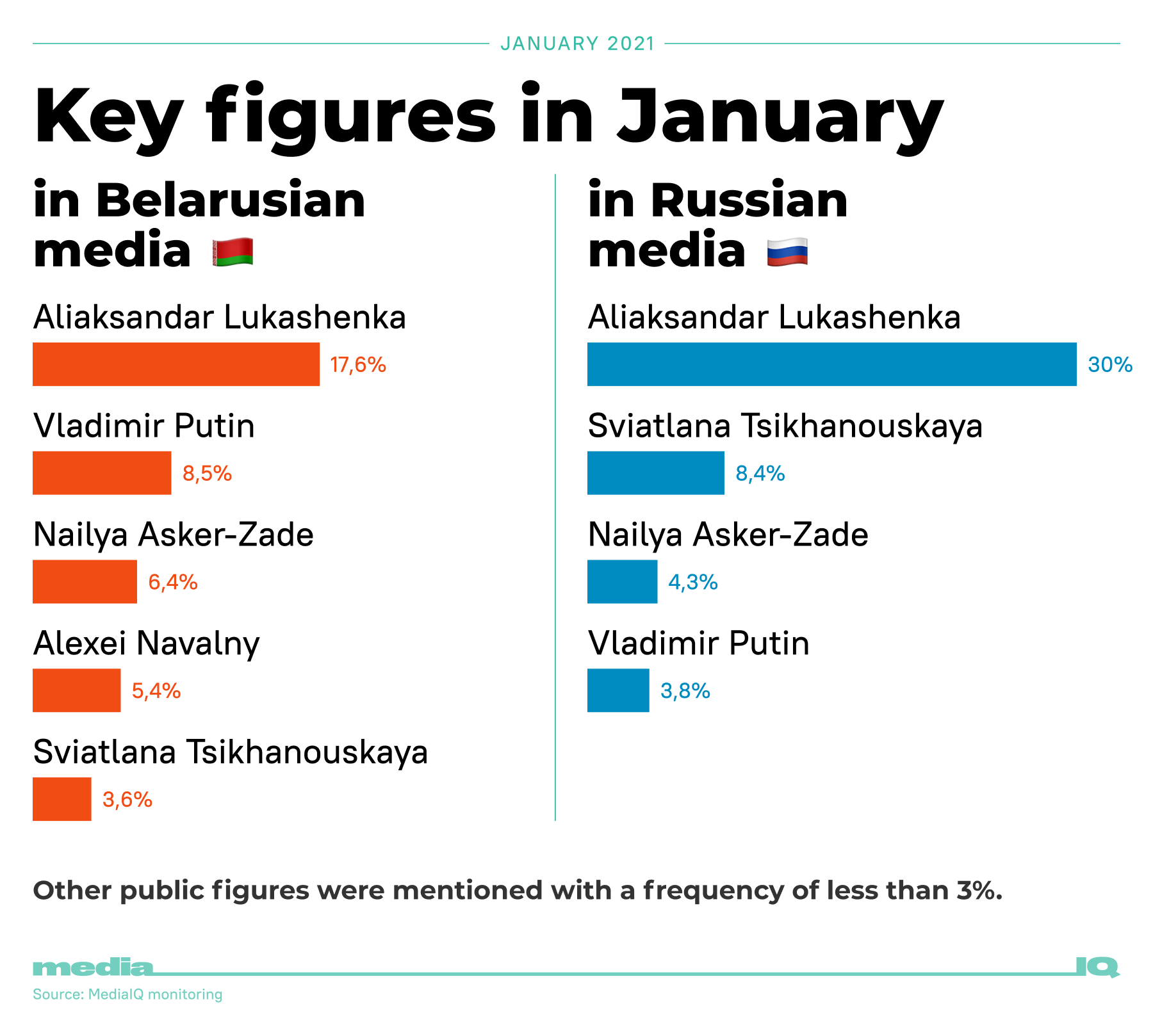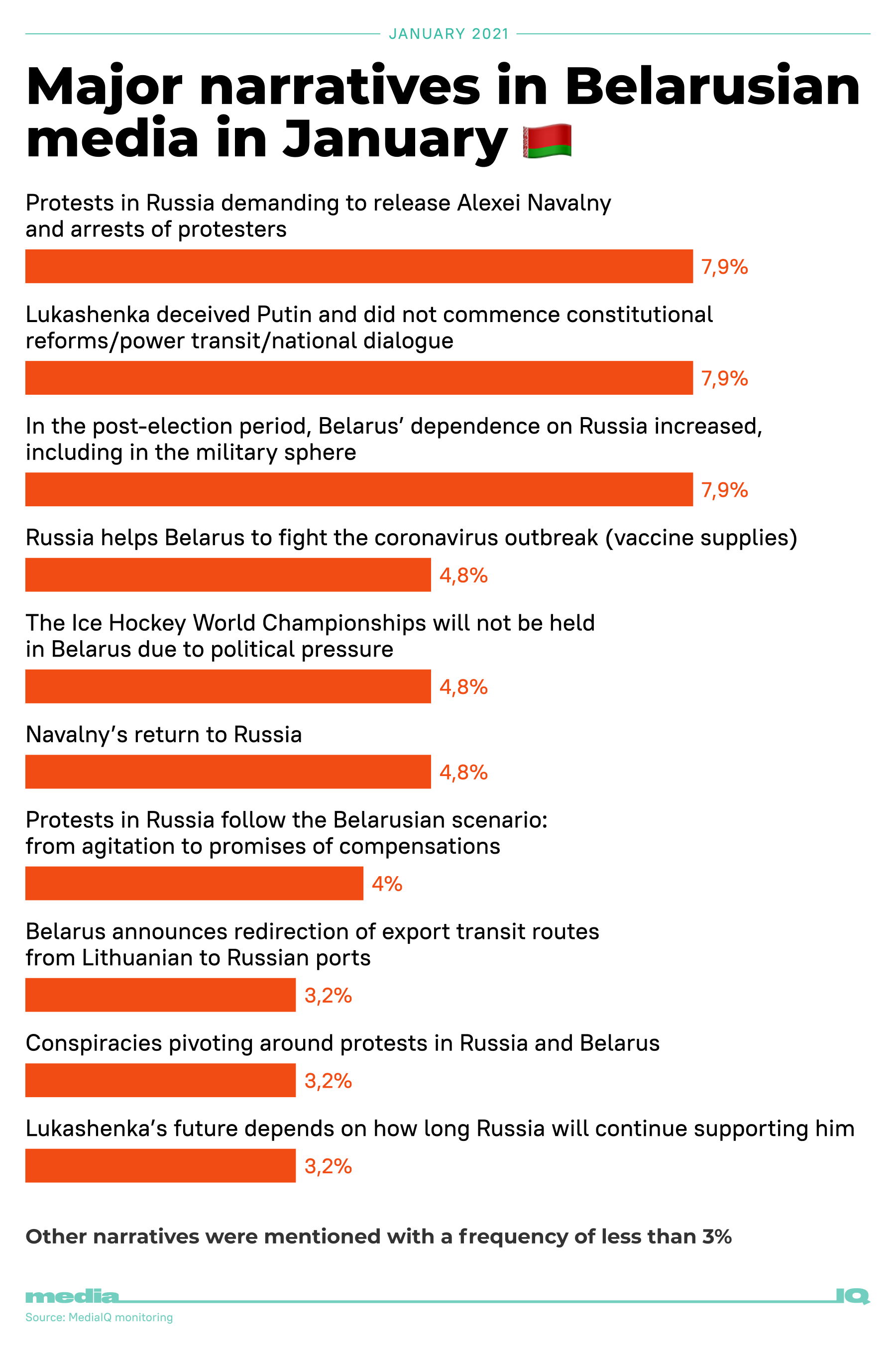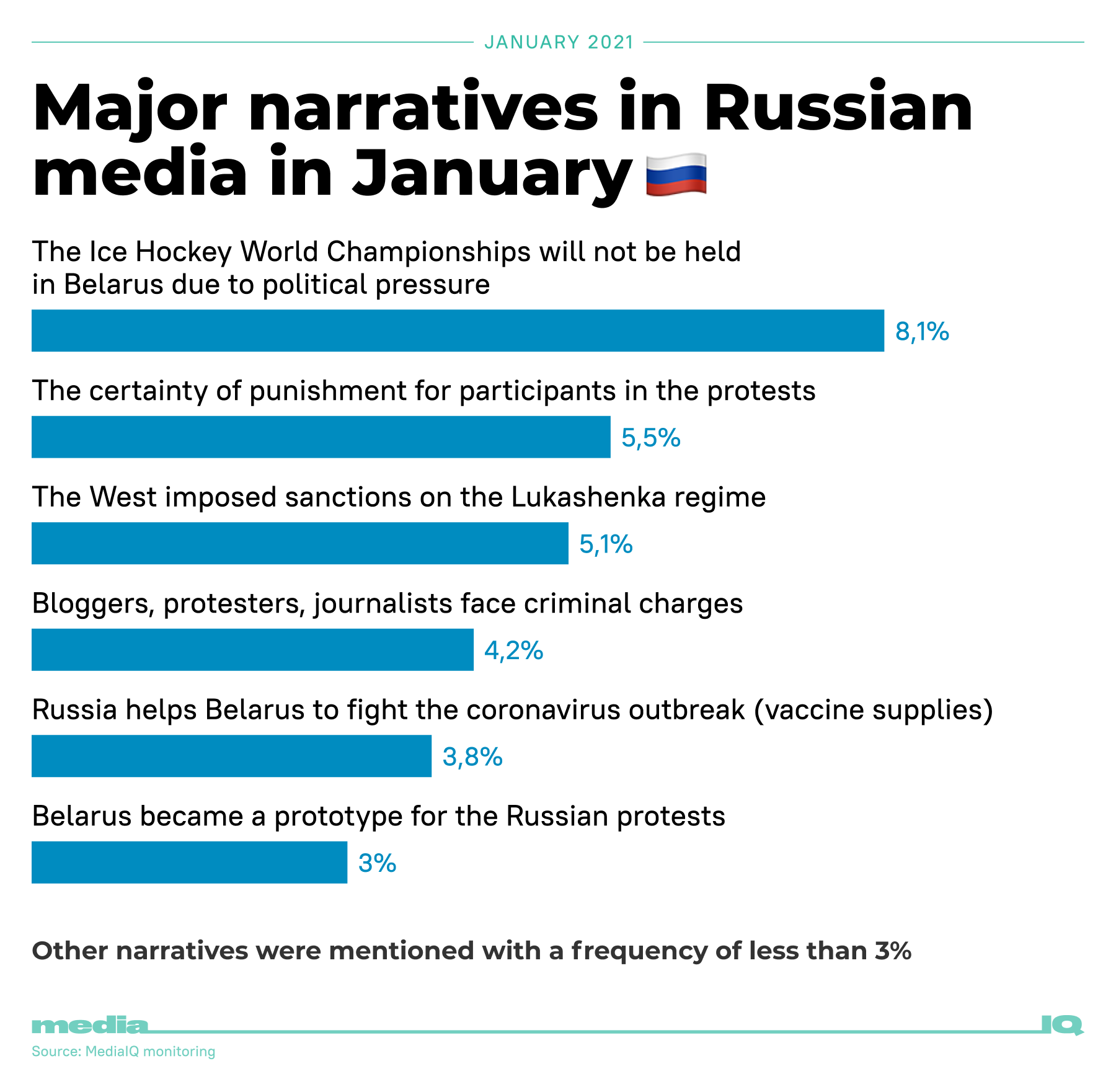Russia 1 journalist was a locomotive for promoting Lukashenka in Russian and Belarusian information space. Kremlin narratives in Belarusian media – January 2021
Overview
We have monitored and analysed 838 articles * (318 Belarusian and 520 Russian) published by leading media outlets in Russia and Belarus between January 1st and January 31st, 2021, concerning Belarusian-Russian relations. Media monitoring focused on Russian publications referring to Belarus, Belarusian publications quoting Russian media outlets, and top-ranking articles indexed by Google News and Yandex News when searching for «Belarusian-Russian relations» ** .
This report covers such topics as who borrowed content from whom, what information sources were used, and which references the media most frequently mentioned or quoted. Finally, we analysed and compared the key messages communicated by Belarusian and Russian media outlets.
Major findings
A TV interview with Lukashenka by Russia 1 presenter Nailya Asker-zade during the holiday period and the associated information vacuum became a locomotive for promoting Lukashenka as a politician and a media personality in both states. Whilst repeated broadcasts of the interview on Belarusian state TV channels were unlikely to have significantly improved Lukashenka’s popularity in Belarus, it was a step towards repairing his reputation in Russia.
For the first time in 12 months, Belarusian and Russian media wrote about the protests in both countries, looking at similarities, and state media promoting a narrative that “the West is to blame for everything”.
In January, a regular narrative in both states was the transfer of the Ice Hockey World Championships from Minsk to Riga, with the prevailing explanation that this was due to “political pressure”.
Belarusian media’s attempts to figure out “how would Russia assess this?” were noticeable in the most frequent narratives, whilst Russian media primarily refrained from assessments of the Belarusian political crisis.
In January, both Russian and Belarusian media mainly reported negatively about developments in each other’s states.
Timeline of events in January 2021
On January 4th, Lukashenka discussed Belarusian-Russian cooperation with Deputy Chairman of the Russian Security Council, Dmitry Medvedev.
On January 4th, the chairman of the Belneftekhim concern, Andrei Rybakov, stated in an interview with Belneftekhim Vestnik, a corporate media outlet, that Belarus intended to continue efforts to diversify oil supplies in 2021 despite the agreement on supplies from Russia. On January 29th, he also said that “the issue of compensation to Belarus for losses incurred in the processing of low-quality Russian oil remains unresolved. We continue consultations with our Russian colleagues and are taking all the necessary steps to resolve this issue.» According to the Russian newspaper Vedomosti, Belarus’ losses could range from $ 271.3 million to $ 435.3 million. On February 25th, 2020, deputy chairman of the Belteftekhim concern Vladimir Sizov said that Belarus had signed a protocol with the Russian Federation on compensation for dirty oil and expected compensation of $15 per barrel.
On January 10th, “Russia 1” TV broadcast a programme entitled “Nailya Asker-zade’s Heroes”, featuring an interview with Lukashenka and his family, filmed «a couple of days before the New Year.» Among other things, Lukashenka said that the price of Russian gas for Belarus in 2021 would be $128.5 per thousand cubic meters. In 2020, Belarus paid $127 per thousand cubic meters for gas, whilst Minsk repeatedly requested a discount, referring to lower prices in Europe (for example, Germany paid $65-68 for Russian gas). In recent years, Belarus’ annual gas imports from Russia were around 20 billion cubic meters.
On January 11th, ex-presidential candidate Sviatlana Tsikhanouskaya appealed to the Lithuanian Foreign Minister, Gabrielius Landsbergis, requesting that the official name of Belarus in Lithuanian be changed from “Baltarùsija” (Belarussia) to “Belarusià” (Belarus) to avoid unnecessary association with Russia.
On January 12th, Lukashenka said: “We are ready to speak with honest people, including the opposition, but not with traitors. We are ready to engage in a dialogue with any opposition [figure] (you have seen this and you know) on any issue, including constitutional changes and the future of our Belarus. But we won’t kneel before anyone!»
On January 12th, Metropolitan Filaret (Kirill Vakhromeev), Honorary Patriarchal Exarch of All Belarus, died aged 86. From January 31st, 1990 to December 25th, 2013, Metropolitan Filaret was the head of the Belarusian Orthodox Church (Belarusian Exarchate of the Russian Orthodox Church).
On January 15th, BYPOL, a group of exiled former Belarusian security officials, published audio featuring alleged comments from Belarusian Deputy Interior Minister Nikolai Karpenkov on October 30th, 2020, where he proposed the creation of a concentration camp for particularly «sharp-hoofed» protesters. The Interior Ministry said the recording was a fake.
On January 18th, the International Ice Hockey Federation (IIHF) decided to move the world championship from Belarus to another location, referring to “security issues beyond the IIHF’s control”. Later the IIHF announced that the championships would be held in Latvia at the Riga Arena and the Olympic Sports Centre. On January 19th, Belarus called the IIHF’s decision an unfounded and dangerous precedent.
On January 18th, Sviatlana Tsikhanouskaya held an online meeting with EU ambassadors to the OSCE, during which she called on international organisations to help organise a safe return home for her and other leaders of the democratic forces.
On January 20th, Russian President Putin and his Belarusian counterpart Lukashenka discussed by telephone cooperation within the Union State and the fight against coronavirus. This was their first telephone conversation of 2021.
On January 29th, when meeting with Belarusian State University students, Lukashenka justified the secret inauguration on September 23rd by fear of an attack on deputies with Molotov cocktails.
Between January 20th and January 22nd, Belarus blocked Russian oil transit in the southern section of the «Druzhba» pipeline towards Feneshlitka and Budkovice for the reverse pumping of Azerbaijani oil Azeri Light from Odessa to the Mozyr oil refinery.
Analysis of information sources
Monitored Belarusian media outlets referred to 574 information sources, whilst their Russian counterparts referred to 1058, including references to other media outlets, public bodies, institutions, and individuals when reporting facts and direct quotes.

During the holiday season, New Year and Orthodox Christmas, «Russia 1″ TV Channel featured a programme entitled “Nailya Asker-zade’s Heroes», in which the Russia 1 journalist interviewed Lukashenka and his son Nikolai at their country house. The interview was a success, becoming the most mentioned topic by the media in both states. Before the broadcast, “Russia 1” prime time news programme «Vesti» presenter Nailya Asker-zade, posted several teasers on social networks, and the programme itself became a source of numerous quotes. Lukashenka’s view on the political crisis, relations with Russia, and a story about his daily routines prompted numerous discussions and dominated the information agenda.
Journalist Asker-zade and TV Channel Russia 1 eventually became frequent sources for the Belarusian media, whilst TUT.BY left the list of most popular sources for the Russian media. Lukashenka was the most popular source of quotes for the press of both states. Nailya Asker-zade’s programme became a locomotive for Lukashenka’s promotion amid the information vacuum characteristic of the winter holiday season.
Key figures in media articles
In respect of integration-related matters, the Belarusian Media mentioned 269 persons, and Russian, 307. We include people identified by their first and last names regardless of whether an article was directly about them. We did not assess who played a greater or lesser role in the story; the score is determined by the number of documents mentioning a particular person in the reporting period.

Nailya Asker-zade became among the most frequently mentioned public figures in the Belarusian and Russian media in January, though she has never before featured in the monitoring history (0% total mentions). Undoubtedly, her popularity grew to a successful interview with Lukashenka and his family.
Mentions of Lukashenka’s youngest son, Nikolai, were just below the 3% radar. Unlike Asker-zade, Lukashenka’s son Nikolai was before mentioned by the media in both states, albeit never crossed the 3% barrier. In January, Belarusian media wrote more about him than about Prime Minister Raman Halauchenka (2.3% and 1.6%, respectively), whilst Russian wrote about him and Halauchenka equally frequently (1.4%). The media’s focus was not on Nikolai but on Aliaksandar Lukashenka; the son talked about his father so that the audience looked at him as a ‘human being’ having apparent virtues rather than terrible failings.
Repeated broadcasts of the interview on the Belarusian state TV channels unlikely have significantly improved Lukashenka’s popularity in Belarus; however, it could be viewed as one of the steps to repair his reputation within Russia.
Analysis of messages communicated
In January, Belarusian and Russian media outlets followed different narratives, with little overlap.


For the first time in 12 months, Belarusian and Russian media wrote about the protests in both countries, reporting about them and looking for similarities. The narrative strand “Russia and Belarus stand [together] against all. Belarus is Russia’s outpost in the West» was marginal, but clearly echoed the claims that the protests against the ruling regimes in the two states were inspired by the West and that «Belarus became a prototype for the Russian protests.»
Moving the Ice Hockey World Championships from Minsk to Riga became one of the most frequent January narratives in the media of both states, with the prevailing explanation that this was due to the “political pressure”. Media sympathising with the Belarusian opposition also referred to such an explanation but assessed it positively, unlike state and regime supporting media, who considered it negatively.
It is significant that the narrative “Lukashenka deceived Putin and did not commence constitutional reforms/power transit/national dialogue” was frequent in the Belarusian media, without breaking the three per cent barrier in Russia. Generally speaking, Belarusian media’s attempts to figure out “how would Russia assess this?” were noticeable in most frequent narratives, whilst Russian media primarily refrained from assessments of the Belarusian political crisis. Presumably, Belarusian reporters attempted to scare the Belarusian leadership when they said that Putin allegedly was offended by Lukashenka. In Russian analysis, this idea was much less frequent.
Negative reporting prevailed
Analysis of less frequent narratives grouped by broader topic shows that in January, adverse reporting prevailed regarding developments in counterpart states. For over six months, this trend was more common in Russian media as Belarusian media reported positively about Russian matters.
